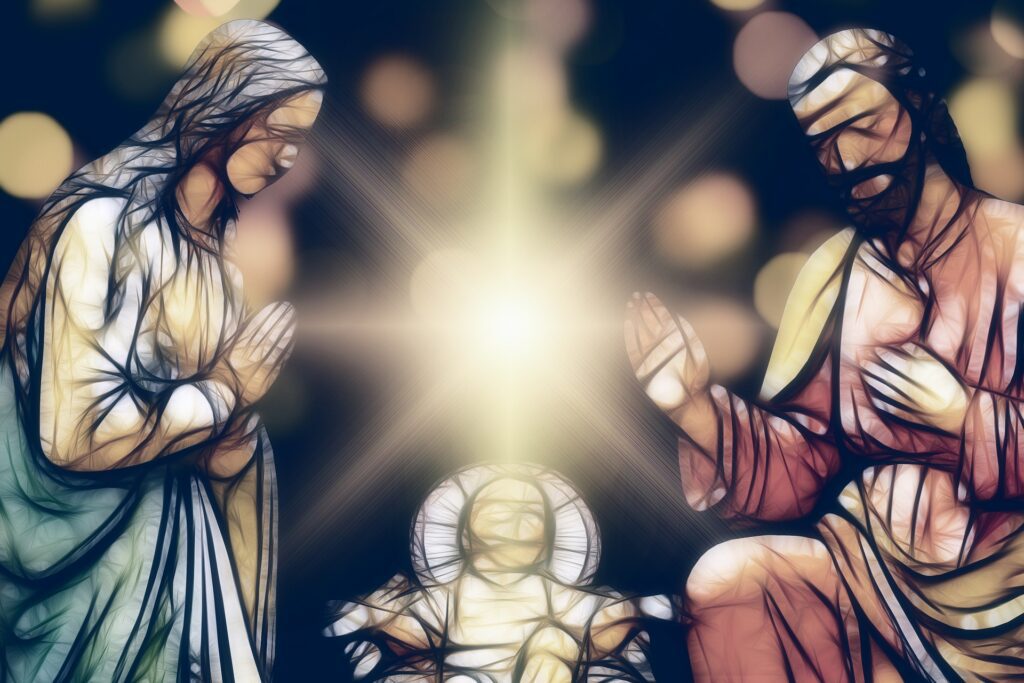This page may contain affiliate links, which means I may receive a commission from purchases made through links.
When Nicodemus the Pharisee came to see Jesus by night, their conversation took off fast. He complimented the Savior, but he was met with a hard truth about his need to be born of the Spirit of God to see the kingdom of God. Here we will look at what it means to have eternal life and how to receive it.
When Jesus told Nicodemus he needed to be born again, he did not understand what he was talking about. So Christ said, “If I have told you earthly things and you do not believe, how can you believe if I tell you heavenly things?” (John 3:12). He challenged Nicodemus’ status-quo way of thinking. He went on: “No one has ascended into heaven except he who descended from heaven, the Son of Man. And as Moses lifted up the serpent in the wilderness, so must the Son of Man be lifted up, that whoever believes in him may have eternal life” (John 3:13-15).
There is a simple outline here of the process which makes the new birth possible: Jesus comes to earth from heaven, he is lifted up from the earth, and a person believes in him. But this needs some unpacking, especially with the rich theology embedded in Christ’s words.
The High Priest Delivers Truth
First, he speaks of ascending into heaven. In the Second Temple Period, there was a tradition which taught that when the high priest entered into the Holy Place, they would encounter the spiritual realm to such a degree that they were spoken of as having ascended into heaven, and they would allegedly return from there with secret knowledge from heaven. This prophetic ministry of the high priest is mentioned in John 11. After Jesus had raised a man named Lazarus from the dead, the Jewish leaders plotted against him. “But one of them, Caiaphas, who was high priest that year, said to them, ‘You know nothing at all. Nor do you understand that it is better for you that one man should die for the people, not that the whole nation should perish.’ He did not say this of his own accord, but being high priest that year he prophesied that Jesus would die for the nation, and not for the nation only, but also to gather into one the children of God who are scattered abroad” (John 11:49-52). For some reason, high priests would occasionally prophesy truth, even if their hearts were far from God, as we know that Caiaphas’ heart was.
The Lord was also alluding here to his coming role as the High Priest of the new temple. Jesus was letting Nicodemus, and us, know that he was bringing to light truths that were once hidden to mankind. This is what Paul refers to as “the mystery hidden for ages and generations but now revealed to his saints” (Colossians 1:26). But rather than being a flawed, sinful high priest like each one before him, he would be the only one who could fix our sin problem.
An Old, Old Story
Next, he refers back to an old story with which Nicodemus would have been quite familiar. In Numbers 21:5-9, we read that the Israelites “spoke against God and against Moses, ‘Why have you brought us up out of Egypt to die in the wilderness? For there is no food and no water, and we loathe this worthless food.’ Then the Lord sent fiery serpents among the people, and they bit the people, so that many people of Israel died. And the people came to Moses and said, ‘We have sinned, for we have spoken against the Lord and against you. Pray to the Lord, that he take away the serpents from us.’ So Moses prayed for the people. And the Lord said to Moses, ‘Make a fiery serpent and set it on a pole, and everyone who is bitten, when he sees it, shall live.’ So Moses made a bronze serpent and set it on a pole. And if a serpent bit anyone, he would look at the bronze serpent and live.”
Jesus calls our attention back to this moment in Israel’s history, when they had become impatient with God, complaining that the Lord had failed them and left them high and dry. Many times, when Jesus referred back using incomplete references to stories or prophecies, it was his expectation that his audience knew the larger context of his allusion. This was commonplace for the Rabbis of his day, so Nicodemus would have remembered not only the serpents and the bronze serpent provided as a solution; he would have remembered the reason they got into that mess in the first place.
This Pharisee knew that the people were guilty of putting the Lord to the test in the wilderness. Biblical hindsight shows us this is something his own party would very often be guilty of in the ministry of Jesus. Though Jesus’ main point was about his role as the solution, the subtext of his statement drives home this very same point. Though Christ would be that icon of healing for the whole world, in the immediate, he was challenging Nicodemus and the whole system he served.
The people of Israel had at this point been through hundreds of years of exile and oppression, all because of their rejection of Yahweh’s commandments and their persistence in injustice and the worship of other gods. That exile never really ended. The Jews (Israelites of the southern kingdom of Judah) were allowed back into their home region, but having been scattered by several empires, even they were not all home. On top of this, there was a people called the Samaritans, who were a genetic and cultural mixture of the people of the northern kingdom of Israel with the people of Assyria who invaded them long ago. Nicodemus knew this, and he would have understood the implications of warning in Christ’s words. Jesus was communicating not simply that he would be the source of healing for those who believe in him, but that there would be grave consequences for those who continued in their rebellion against God, who had come to his people in the flesh. Eventually, the rejection of Christ by the Jews would lead them to a similar fate, history repeating itself in the destruction of Jerusalem and her temple in AD 70.
Believing is Doing
Despite the judgment to come, Jesus gives Nicodemus hope, along with all those who would look back on this conversation. He would be “lifted up, that whoever believes in him may have eternal life” (John 3:15). He goes on: “For God so loved the world, that he gave his only Son, that whoever believes in him should not perish but have eternal life. For God did not send his Son into the world to condemn the world, but in order that the world might be saved through him. Whoever believes in him is not condemned, but whoever does not believe is condemned already, because he has not believed in the name of the only Son of God” (John 3:16-18).
Here is one of the most quoted Bible passages of all time. The timeless truth proclaimed by many an evangelist is that we can be saved, born again (from above) when we place our faith in Christ, or believe in him. But what does it mean to believe?
To begin answer this question we must look at the last three verses of John 2, right before this conversation takes place.
“Now when he was in Jerusalem at the Passover Feast, many believed in his name when they saw the signs that he was doing. But Jesus on his part did not entrust himself to them, because he knew all people and needed no one to bear witness about man, for he himself knew what was in man” (John 2:23-25). The very next chapter begins in verse 1 with “Now there was a man of the Pharisees…” This reference to man in general followed by a specific man ties together these two passages thematically. But what does this connection have to do with defining belief?
An examination of ancient Greek verbs will greatly help us here, so bear with me a moment to lay it out. In John 2:23, when it says, “many believed in his name,” the word “believed” is in the aorist tense. In other words, this was a moment of belief in the past. This is a positive thing, of course. This same tense is used of Abraham when Paul says that he “believed God, and it was counted to hik as righteousness” (Romans 4:3). But there is a contrast in this portion of John between a few kinds of belief.
The first is the aorist tense, attributed to the people. The second is said of Christ, that he “did not entrust himself to them” (John 2:24). The verb for “entrust” is the same root word pistus, meaning “faith; trust.” And this use of it is in the imperfect tense, indicating that in the past, this was an ongoing event, not concluded in the moment referred to. Though it would sound clunkier in a full reading, a more literal translation of this statement would be that he “was not entrusting himself to them.” Jesus knew what was in people, in their depraved nature, and he knew that he could not place his own faith in them.
The third contrasted form of belief is what Jesus says leads to eternal life. This verb is in the present tense. In John 3:15, for example, a literal translation would say, “that everyone believing in him may have eternal life.” , and each time Jesus promises eternal life in his dialogue with Nicodemus, it is offered to those who are believing, not simply those who once believed. Both faith and eternal life are to be present realities for us. This, although not a complete picture by itself, gives us a taste of what the rest of Scripture reveals to be the nature of true saving belief.
True belief in Christ is not just that we accept his message in a moment. This is contrasted with what Jesus refused to do toward humanity. He was not entrusting himself to us. Instead, what we ought to do toward Christ is to entrust ourselves to him in an ongoing way. Real faith in Christ is not one prayer or moment in which we accept Christ. That is only the beginning. Real faith is to live life with a disposition of loyalty to Christ. Being born of the Spirit begins a journey of learning how to “keep in step with the Spirit” (Galatians 5:16).
Check out Salvation by Allegiance Alone by Matthew M. Bates!
James tells us that “faith apart from works is dead” (James 2:26). This does not mean that we earn eternal life by what we do for Christ. But it does mean that if we are doing nothing with this gift God has given us, we are showing by our inaction that our faith has become insincere and of no good. John reinforces this idea at the end of his narrative by saying, ”Whoever believes in the Son has eternal life; whoever does not obey the Son shall not see life, but the wrath of God remains on him” (John 3:36). And Paul urges the Corinthians, “Examine yourselves, to see whether you are in the faith. Test yourselves. Or do you not realize this about yourselves, that Jesus Christ is in you?—unless indeed you fail to meet the test!” (2 Corinthians 13:5).
What sobering words!
When we hear challenges like this, it can be tempting to become discouraged and sulk into feelings of despair over our sin and our disloyalty. But my goal here is the same as that of Christ: to call you to the hope of healing and eternal life that comes from looking to him, believing in him, trusting in him.
Do not allow your failures or your deficiencies to convince you that eternal life has become unavailable to you. Eternal life is available to you now, not just in the life after death. By looking anew upon Jesus, exalted in the cross, we will see his faithfulness to us despite our depravity. We will see his goodness despite our wickedness.
God does not expect us to be flawlessly without sin. John tells us, “If we say we have no sin, we deceive ourselves, and the truth is not in us” (1 John 1:8). Yet, “if anyone does sin, we have an advocate with the Father, Jesus Christ the righteous” (1 John 2:1). When we live life with a desire to please him, we will turn to our advocate, and we will begin to see his goodness and faithfulness begin to work in us to heal us and lift us up into new heights of righteousness.
So turn to the Lord today, and never stop turning to him. Walk in the new life you received when you first believed. Find healing in Christ, our serpent in the wilderness.
*If you enjoyed this post, please comment your thoughts down below and consider subscribing to receive updates on new blog posts.




I’m so thankful for the hope we have in Christ Jesus. He is our defender, cleanser of sin, and our true advocate with the Father. Thank you for this reminder to keep striving for what is good in His sight.